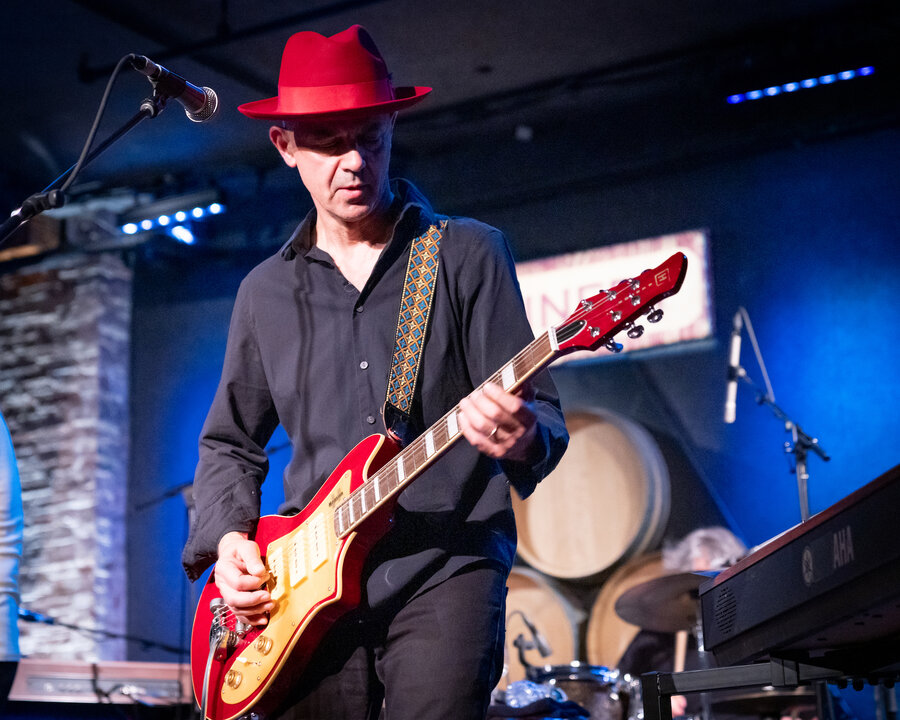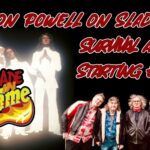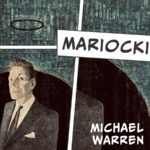
James Mastro - photo by Jini Sachse
Step into the world of James Mastro, a seasoned musician with longstanding collaborations with Ian Hunter, Patti Smith and John Cale. However, his debut solo album, ‘Dawn of a New Error’ is a raw exploration of authenticity and storytelling which is typified by lead single, ‘Right Words, Wrong Song’. Jason Barnard speaks to James about his music, where every note contributes to a portrait of an artist entering a new chapter.
‘Dawn of a New Error’ marks your return as a singer and songwriter. What prompted this return, and how does it feel to step into that role again?
I’d been writing over the years, and the songs were building up, but I was so busy with Ian Hunter and other projects that I really didn’t have time to consider putting something out. With the combination of Ian taking a break from touring (because of tinnitus), and the shutdown caused by COVID, I suddenly found myself with some time to revisit and record what I’d been working on.
To be honest, stepping back to the center of the stage is a bit daunting. I’ve enjoyed being the guitar player for some incredible people these past years. Now I have to make sure that I show up to my own rehearsals.
Can you tell us about the inspiration behind the album’s title and the overall theme of it?
Life is all about mistakes: making them, avoiding them, causing them. This is an everyday occurrence. I’ve made some big ones in my life (don’t ask), but I try to learn from each one. The fact that I haven’t released anything of my own for quite awhile, the title seemed apropos, as this will mark a new era of mistakes!
‘Right Words, Wrong Song’ featuring Ian Hunter, touches on the concept of truth and perception. Could you delve deeper into the message behind the song?
Ian is probably the most honest writer I’ve worked with, so you can’t help but be influenced by that after standing alongside him for twenty+ years. The song is really about how these days you can dial up any news or social media that fits your agenda. Truth and science are no longer absolute, and often ridiculed. It shouldn’t be about who shouts the message loudest, it should be about what is right and what is wrong.
How did the collaboration on that track with Ian come about?
When I wrote the bridge for that song, it was written with him in mind. When I asked him if he’d come in to sing it, he agreed, but his lawyer negotiated that a shepherd’s pie had to be supplied.
As the album’s producer, Tony Shanahan, is known for his work with Patti Smith. How did his influence contribute to the sound and production of ‘Dawn of a New Error’?
Tony and I have worked together a lot over the years, since Health & Happiness Show in the ‘90s, and then later when I did a brief stint with Patti, and countless other projects. We speak the same musical language, have similar record collections, so our reference points intersect. He’s an excellent musician who is all about the parts that make the song better, there’s no ego involved. You have to be honest to be a good producer, and he is that. Sometimes more than you’d like to hear, but right is right!
The album features a notable lineup of drummers, including the late Louie Appel and others. How did these collaborations shape the overall musical landscape of the record?
Every drummer on this record contributed so much, and Tony and I gave them free rein to interpret. These songs had not been played live before we recorded them, so we had no preconceived concepts of where they should go. Let the mistakes happen, and by the end you find the right door. Louie played with so much heart and feel; Brian Griffin creates little percussion symphonies while he’s playing; Steve Goulding is as solid as they get; and Bill Dobrow floats over the drums.
As a guitarist, bassist, and mandolin player, how did you navigate the different roles while recording the album, and do you have a favourite instrument to play?
It’s all about what works best for a song, and not being too precious about it. Having Tony there to play bass took a lot of that pressure off of me, because he always plays what I’m hearing in my head. Guitar is my fave instrument by far, as it’s what I started with and still get excited about. What can possibly be better than playing an electric guitar through a nice, old valve amp? Had my first instrument been tuba, we may not be having this conversation.
As you’re currently on the road with Alejandro Escovedo, Southside Johnny, Lenny Kaye’s Nuggets, and Ivan Julian, how does your experience as a sideman inform your approach to your solo work?
Well, it’s all about getting along with the other people onstage – musically and socially; the two go hand in hand. Being virtuosos does not make for a good band; listening to what everyone else is doing and reacting to that is the key. Bands like The Stones, Beatles, Ramones made some of the most powerful music together – as a unit, not as shredders. I try to carry that into my work. Even if I wrote the song, I want everyone to feel that they’re also contributors.
Your extensive career includes collaborations with artists including Mott the Hoople, Patti Smith, and John Cale. How have these experiences influenced your own musical style and storytelling?
All those artists influenced me greatly even before I worked with them. They’re the reasons I started playing. As mentioned earlier, Ian Hunter is the most honest writer I know, so watching him work on songs is a master class. I don’t want to let him down.
Patti is a true force of nature. Onstage, her voice is the lead guitar that you follow and ride the wave. There’s a freedom there that is exciting, and something that I strive for in every performance, be it live or in the studio.
Mr Cale taught me that nothing is sacred. Every night he would rearrange and deconstruct his songs. Emotion drove that, along with the constant search for something new. He’s as great an explorer as Magellan or Zheng He.
Your production credits include a diverse range of artists. How does the experience of producing your own work compare to producing for others?
The artist is always right, until they’re wrong! It’s a balancing act between ego and art, and you have to be able to know which one you’re dealing with at that moment. What I hear in my head as the perfect part may be opposite of what the artist hears. So I try to understand it, and see things from their perspective. It’s about listening to every aspect – what does this song mean to the artist, what are the lyrics saying, how is the music supporting the lyrics? Ultimately, every decision is hopefully made on what makes the song stronger. Not just liking it because you played a blistering solo. If it doesn’t make the song better, get rid of it. Working with others in that capacity has helped me when dealing with my own material the same way.
Are there any specific songs on the album that hold particular significance to you, and if so, why?
All these songs are just little Post-Its to myself to remind me of certain things. “Never Die” was written for my parents, who I lost within months of each other. It’s a reminder that the ones you love never really leave you.
Finally, with headline tours planned for the US and the UK in the Spring, what are you most looking forward to in terms of performing your new material live?
Having never performed these songs live before, I look forward to seeing how they grow and change over time. Audience reaction helps shape that, and a fan will always come up with a different perspective to a lyric that you hadn’t thought of, so that can inspire a dawn of a newer error.
Further information
Dawn of a New Error is due out in February 2024 via MPress Records, presave it here.




